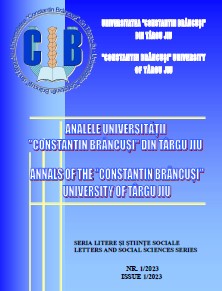ANALYZING THE EFFECTS OF DEMOGRAPHIC AND SOCIO-ECONOMIC FACTORS ON EFFICACY OF DIGITALIZATION IN INDIA’S HIGHER EDUCATION SYSTEM DURING COVID-19 PANDEMIC
ANALYZING THE EFFECTS OF DEMOGRAPHIC AND SOCIO-ECONOMIC FACTORS ON EFFICACY OF DIGITALIZATION IN INDIA’S HIGHER EDUCATION SYSTEM DURING COVID-19 PANDEMIC
Author(s): Bharat Kumar Meher, Iqbal Thonse Hawaldar, Ramona Birau, Santosh KUMAR, Sumit Singha, Ninulescu Petre Valeriu, Abhishek Kumar Gupta, Sheila SisonSubject(s): Higher Education , Health and medicine and law, Demography and human biology, ICT Information and Communications Technologies, Socio-Economic Research, Distance learning / e-learning, Pedagogy
Published by: Editura Academica Brancusi
Keywords: Digital education; digitalization in higher education; covid-19 pandemic; indian education sector; multinomial logistic regression; digital divide;
Summary/Abstract: The purpose of this study is to assess the efficacy of the digitalization in higher education of Bihar during the lockdowns of colleges and universities due to covid-19 pandemic and to find whether gender, course opted, stream of study, medium of study, residential area, family income level, online class attended, actual time spent on using internet for education, and ownership of gadgets used in online classes affect the effectiveness of digitalization in higher education in Bihar. The data used in this study are primary in nature and collected by using the questionnaire method from 429 students of thirteen different state universities and one open university. As many predictors are categorical in nature multinomial logistic regression has been used to assess the impact of various demographic and socio-economic factors on efficacy of digitalization in higher education in Bihar. It has been found that the variables like monthly income of the family, time actually spent by the students for education by using internet per day, stream of the study, medium of the study, residential area and gender are significant factors that affect the digitalization in higher education in Bihar during the pandemic. The study could contribute in two ways. First, the results of efficacy of digitalization in higher education in Bihar of a lowest education index ranking state will depict an authentic picture of effectiveness of digitalization in higher education in Bihar in backward states and thereby add up to the existing literature and second, the significant factors of the model could assist the policy makers in taking corrective measures while taking any decision to digitalize the education in such kind of states in India.
Journal: Analele Universitatii „Constantin Brancusi” din Targu Jiu – Seria Litere si Stiinte Sociale
- Issue Year: 2023
- Issue No: 01
- Page Range: 11-29
- Page Count: 19
- Language: English

